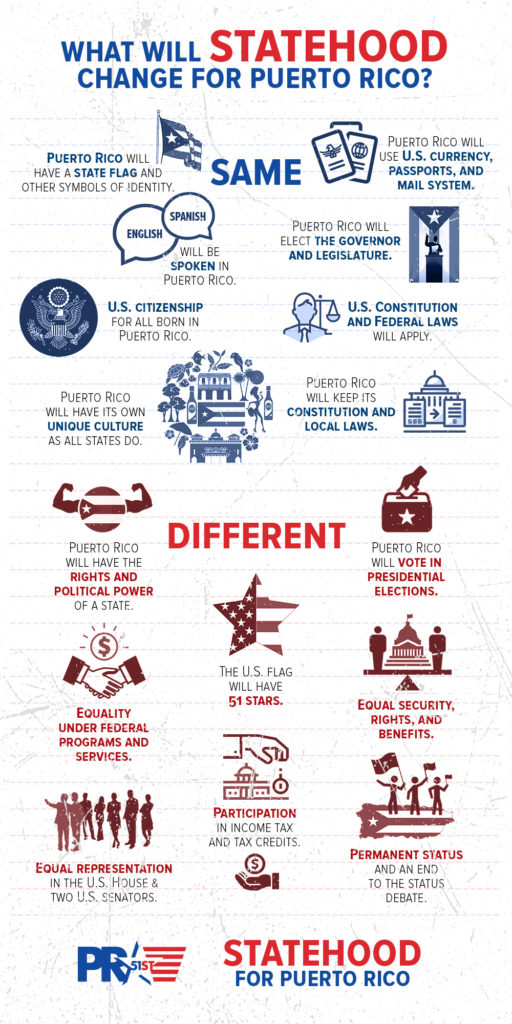The House Natural Resources Committee has held two hearings on a pair of bills about Puerto Rico’s status in recent months.
Hearing Confirms Statehood Least “Unintended Consequences” Risk
The two bills
The first is HR 1522, the Puerto Rico Statehood Admissions Bill. This bill responds to the 2020 plebiscite, in which a majority of Puerto Ricans voted for statehood, with a procedure to admit Puerto Rico as the 51st state of the Union.
Under this bill, Congress would offer statehood to Puerto Rico, and a referendum would be held in which the voters could choose whether to accept the offer or not. If Puerto Rico again votes for statehood, the bill lays out a process to make the territory a state. The process is the same as the process used for Alaska and Hawaii, the most recent territories to become states.
The second is HR 2070, which calls for a status convention to come up with options which will be placed on a ballot for yet another plebiscite in Puerto Rico.
While the Department of Justice reiterates that the only options for Puerto Rico’s status under the constitution are statehood, independence, or territory status, the Congressperson who introduced the bill disagrees, saying, “People continue to allege unconstitutionality of HR 2070, with complete disregard to the fact that we have the pen. The United States Congress. We. We have this pen. We write legislation. We pass the law. It is up to Congress with authority precisely vested by the constitution to decide what form of decolonization we should pursue.”
In addition to this clear conflict with the U.S. Constitution, HR 2070 also included a variety of concerning ideas:
- Education of voters must take place using “traditional paid media”.
- Delegates to the convention must limit campaign spending to not more than $25,000.
- A Congressional Commission will be established, which will have authority to make recommendations about culture, language, and other aspects of daily life.
- “If the referendum under this Act is approved by the people of Puerto Rico, Congress shall approve a joint resolution to ratify the preferred self-determination option approved in that referendum vote.” Congress obviously cannot be required to do this.
- Annual reports are required — implying that the process will take years.
Votes on both bills
Rep. Grijalva, the chair of the committee, hopes that both bills will be voted on by the committee this year. According to El Nuevo Dia Grijalva said that the concerns of the Department of Justice will be dealt with in the committee. “Congress has enough authority and freedom to deal with these issues,” said Grijalva.
Grijalva favors an educational campaign, which gained funding in 2014. Statehood supporters generally do not oppose an educational campaign, although Governor Pierluisi is on record saying that Puerto Rican voters fully understand the status options.
At the most recent hearing, a supporter of HR 2070 claimed that statehood “was not clearly defined.” There are currently 50 states. Under the constitution of the United States, all states must be treated equally. It is hard to imagine that there could be any confusion about what being a state entails.

We offer this infographic to clear up any lingering confusion on this point.
However, we must also point out that HR 2070 does not offer any definition of “other non-territorial options.” The supporters claim that this is because their bill is “status agnostic.” In fact, it shows that the bill will just plunge Puerto Rico back into the same fruitless discussions that have been going on for decades.








No responses yet